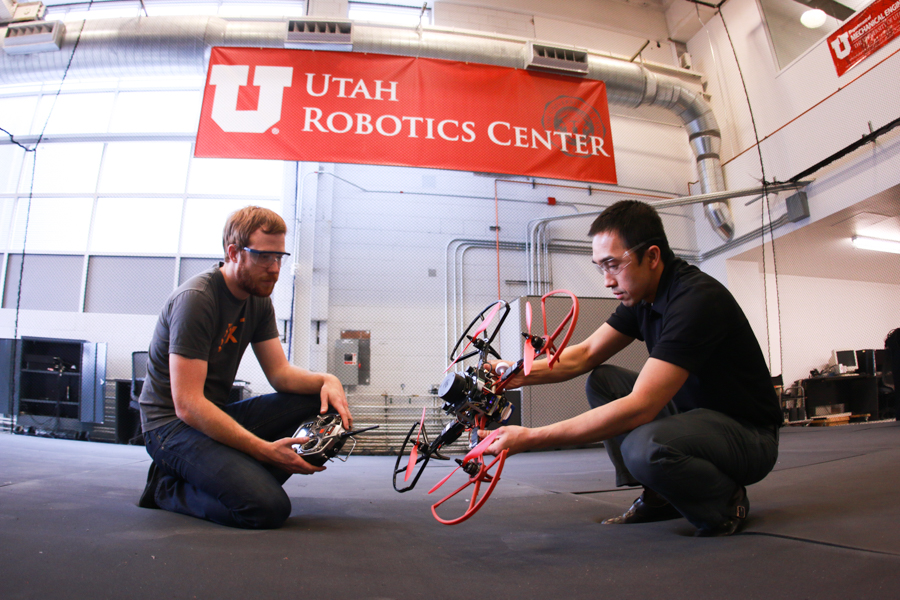Jake Abbott (PI) and Tucker Hermans (co-PI) were awarded a National Science Foundation grant “Dexterous Magnetic Manipulation of Non-Magnetic Objects with Stationary Electromagnetic Dipole-Field Sources”. $554,285. 5/15/2022-4/30/2025....
Read MoreKuntz Lab Presents Two Papers at 2022 Hamlyn Symposium on Medical Robotics
Kuntz Lab will have two papers appearing at the 2022 Hamlyn Symposium on Medical Robotics: “Toward Targeted Therapy in the Brain by Leveraging Screw-Tip Soft Magnetically Steerable Needles,” Trevor J. Schwehr, Adam J. Sperry, John D. Rolston, Matthew D. Alexander, Jake J. Abbott, and Alan Kuntz; as well as “Optimizing Continuum Robot Tendon Routing for Minimally Invasive Brain Surgery,” Margaret Rox, Aidan Copinga, Robert P. Naftel, Robert J. Webster III, and Alan Kuntz....
Read MoreProf. Lenzi Receives 2020 NSF CAREER Award
Department of Mechanical Engineering Assistant Professor Tommaso Lenzi has been awarded a National Science Foundation Faculty Early Career Development Program (CAREER) award. The CAREER program is one of the NSF’s most prestigious award programs, offering 5 years of support to early-career faculty with the potential to serve as academic role models in research and education. The research grant, entitled “Bio-inspired Multi-joint Design and Control for Efficient and Lightweight Wearable Robots” will provide new knowledge related to wearable robotics by using bio-inspired actuation systems that concurrently assist multiple joints, much like human muscles. Existing exoskeletons are heavy and inefficient, which...
Read MoreCongratulations to Profs. John Hollerbach and Jake Abbott for receiving awards at 2020 IEEE ICRA
Today at the ICRA awards ceremony, John Hollerbach received the IEEE RAS George Saridis Leadership Award in Robotics and Automation for “foundational research on robot calibration and leadership and service in publications, conferences, and society management”, and Jake Abbott received a Distinguished Service Award from IEEE Robotics and Automation Letters as an Outstanding Reviewer for the period 2015-2019....
Read MoreProf. Kam Leang elevated to ASME Fellow
Congratulations to University of Utah mechanical engineering associate professor Kam Leang, who has been elected a Fellow of The American Society of Mechanical Engineers. Read more… ...
Read MoreProf. John Hollerbach receives the 2020 IEEE RAS George Saridis Leadership Award in Robotics and Automation
Congratulations to Prof. John Hollerbach! He received the 2020 IEEE RAS George Saridis Leadership Award in Robotics and Automation from the IEEE Robotics and Automation Society (RAS). The award will be presented to him at the 2020 IEEE ICRA conference in Paris. For your information, past recipients of this prestigious award are listed at: https://www.ieee-ras.org/awards-recognition/society-awards/69-awards-recognition/society-awards/56-ieee-ras-george-saridis-leadership-award-in-robotics-and-automation ...
Read MoreDr. Daniel Drew will join University of Utah Robotics Center
Daniel Drew will be joining the Robotics Center and the Department of Electrical and Computer Engineering from a postdoctoral research position in Mechanical Engineering at Stanford University. He received his Ph.D. in Electrical Engineering from UC Berkeley in 2018. His research focuses on the development of autonomous insect-scale systems, bridging the worlds of robotics, MEMS, and design. His past work includes development of a flying millimeter-scale robot with no mechanical moving parts (the “ionocraft”), investigating new methods for resource-constrained communication and control, and studying how humans interact with swarms of insect-scale robots. Website link: http://www.danieldrew.me...
Read MoreDr. Alan Kuntz joins University of Utah Robotics Center
Alan Kuntz will be joining the Robotics Center and the School of Computing from a postdoctoral research position in mechanical engineering at Vanderbilt University. He earned his PhD from the University of North Carolina at Chapel Hill in computer science. His research interests include shared autonomy, motion planning, and design optimization for manipulators and tentacle-like, flexible robots with an emphasis on home assistance and surgical applications. His interest in health care applications stems from his previous experience as a paramedic in the 911 system of Albuquerque, NM....
Read MoreProf. Leang receives new U.S. Airforce Phase I STTR project for autonomous aerial-robot chemical sensing
Kam Leang and industry partner Nevada NanoTech System recently received a U.S. Airforce Phase I STTR project for autonomous aerial-robot chemical sensing. The project will leverage the expertise of both teams to create intelligent agents for applications that include emergency response....
Read MoreProf. Mascaro receives $348K NIH grant to simulate tendon reconstructive surgeries
“Simulating Tendon Reconstructive Surgeries using a Virtual Hand Model and Robotic Testbed,” National Institute of Arthritis and Musculoskeletal and Skin Diseases (NIH R21). PI: Stephen Mascaro, Co-PI: Kenneth Foreman, 07/02/2019-05/31/2021, $347,798. The goal of this project is to advance tendon reconstructive surgery by providing a new way to predict the surgical outcomes using a virtual model for surgeons to examine the outcomes of surgery like range of motion and strength of grip. We currently have a unique virtual model of the tendon system of the human finger that can simulate the kinematics of the tendons and predict the pose...
Read More



